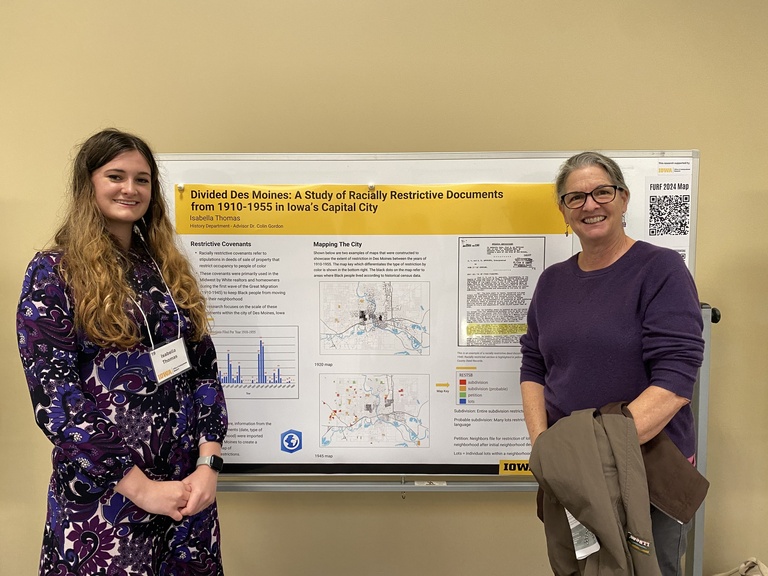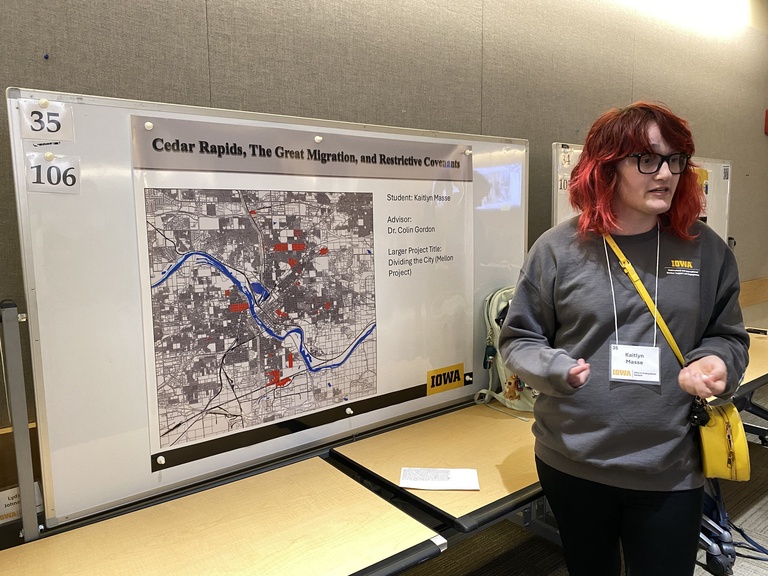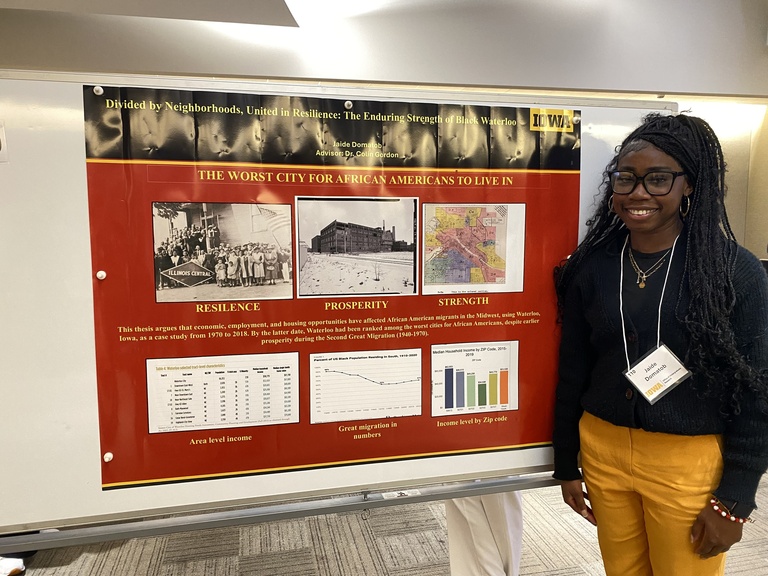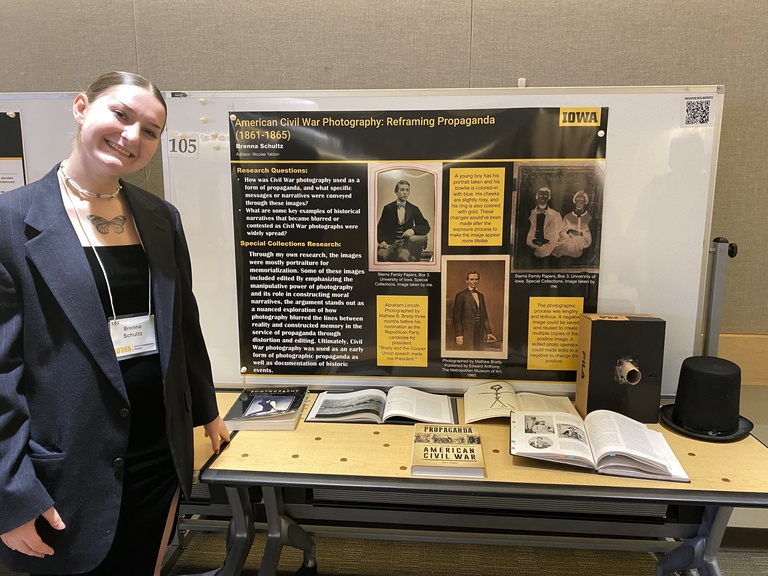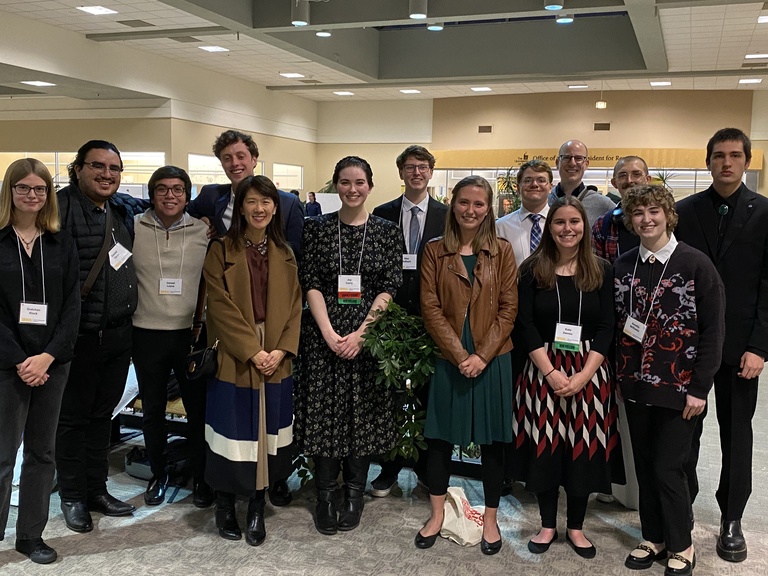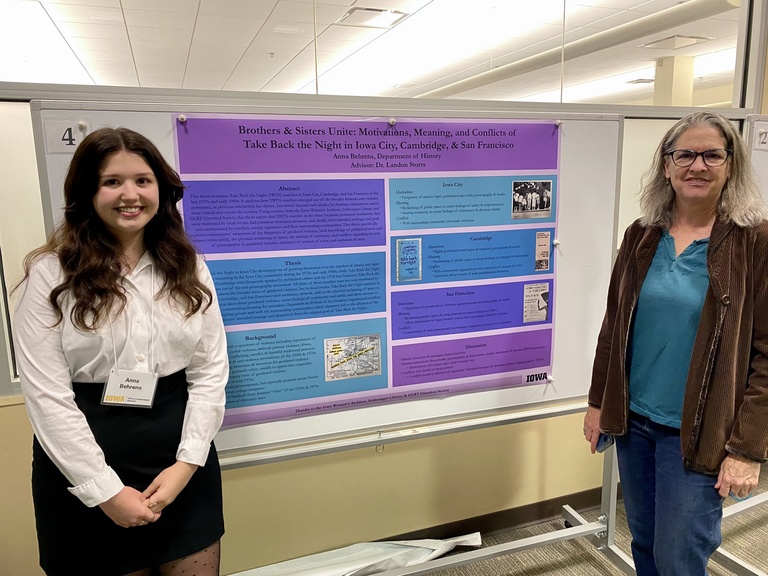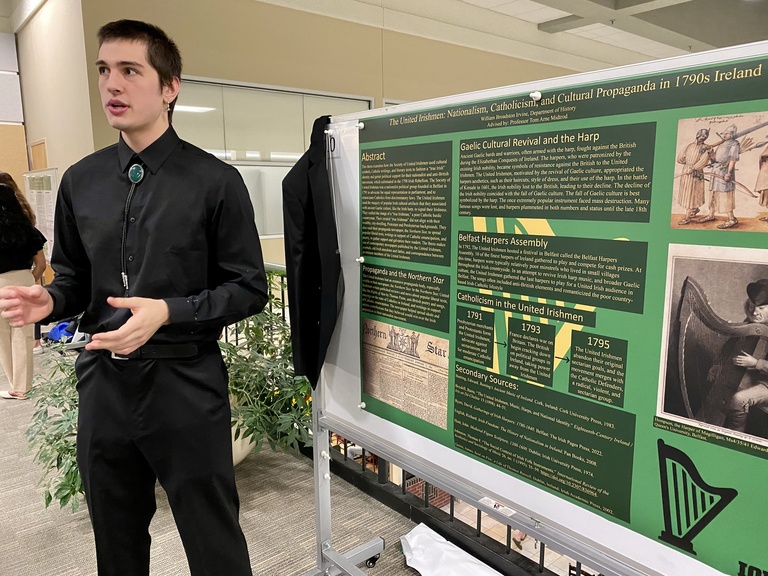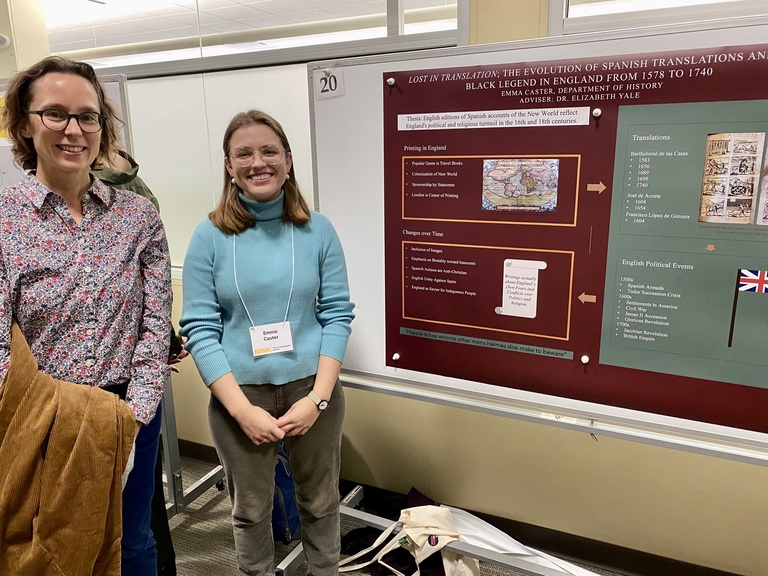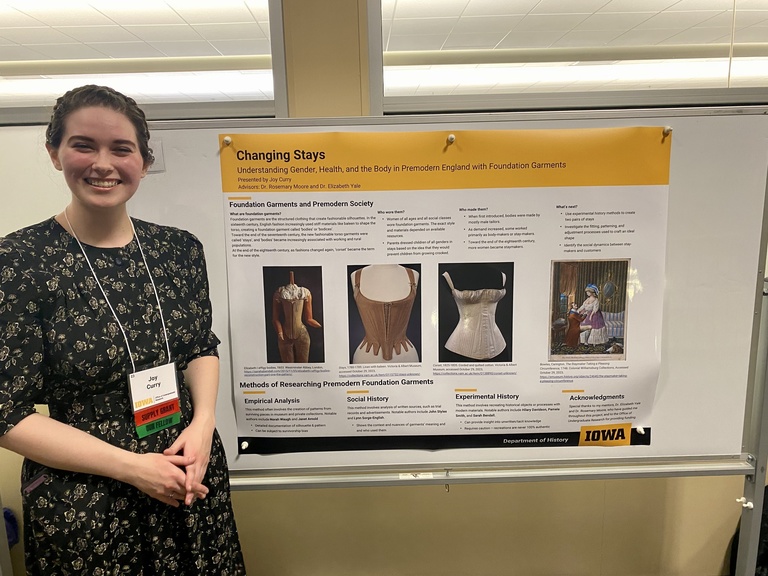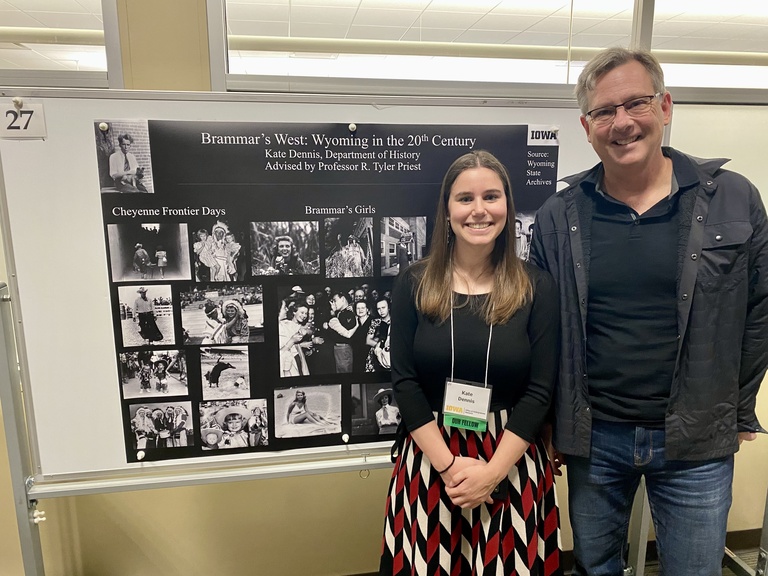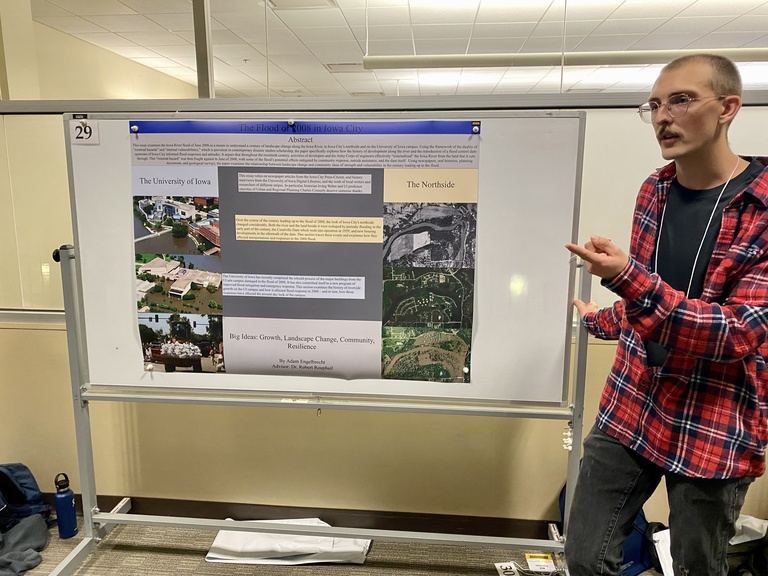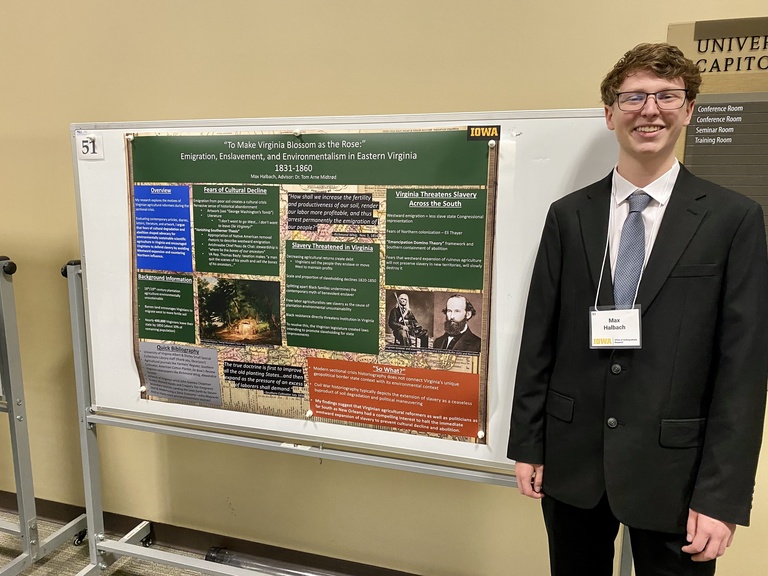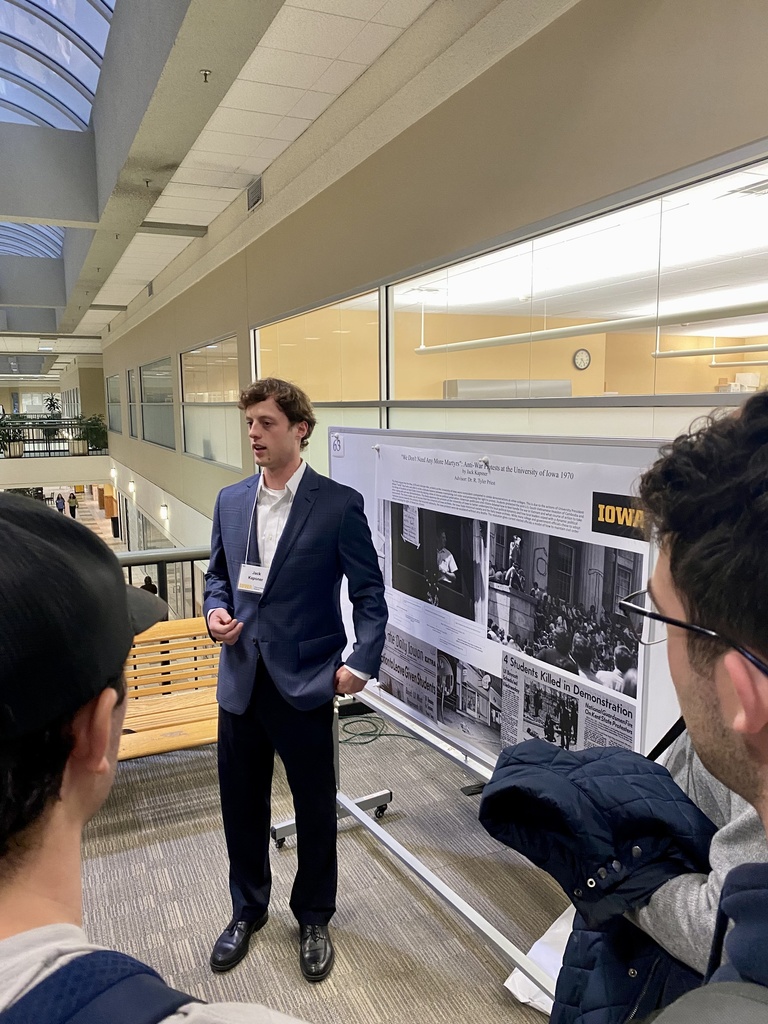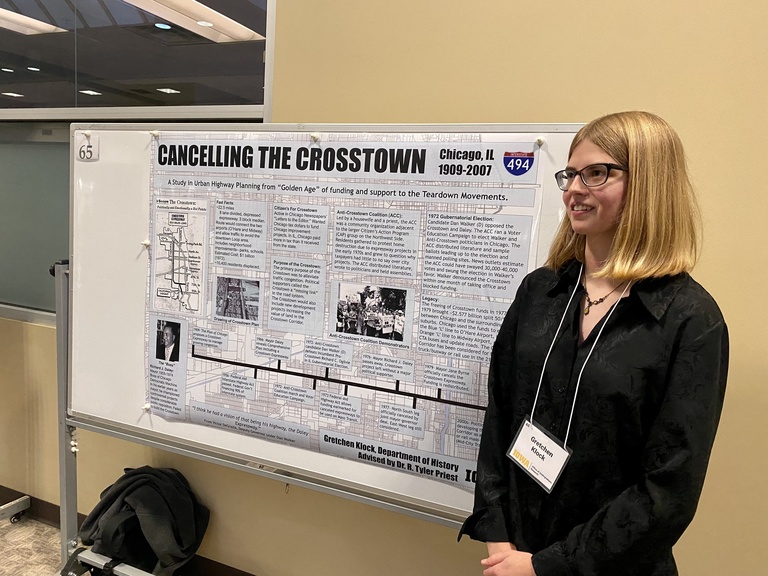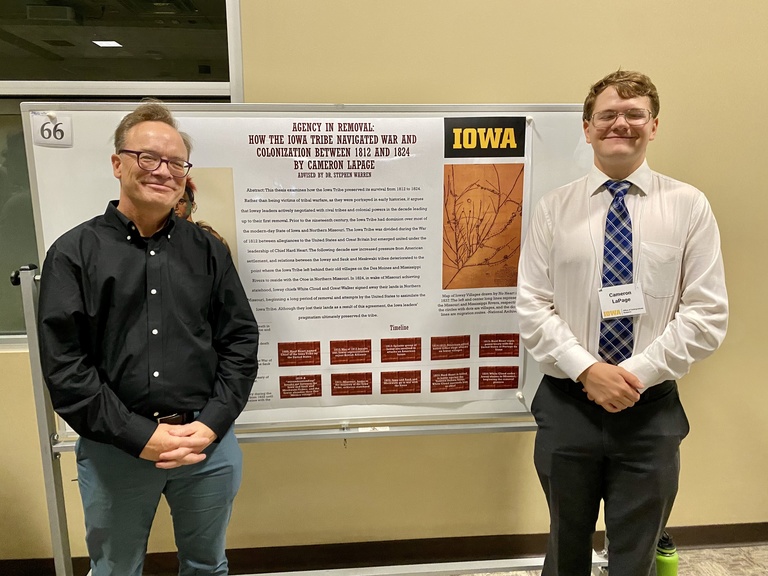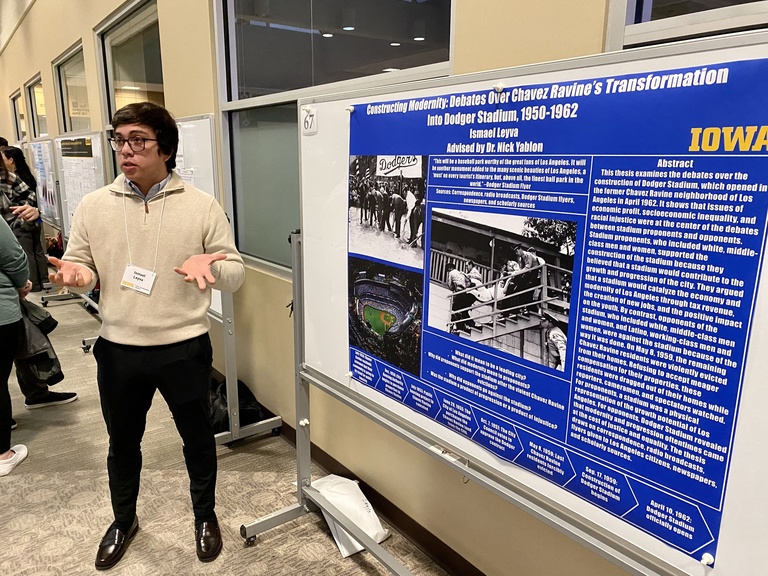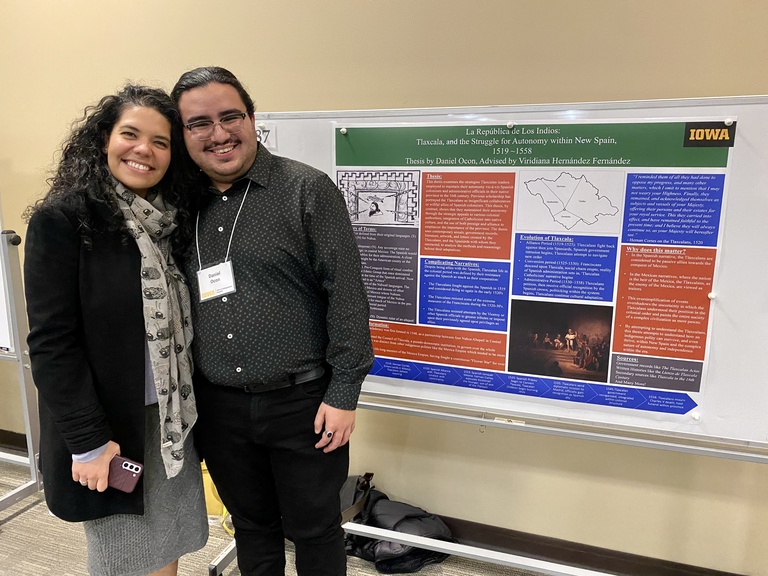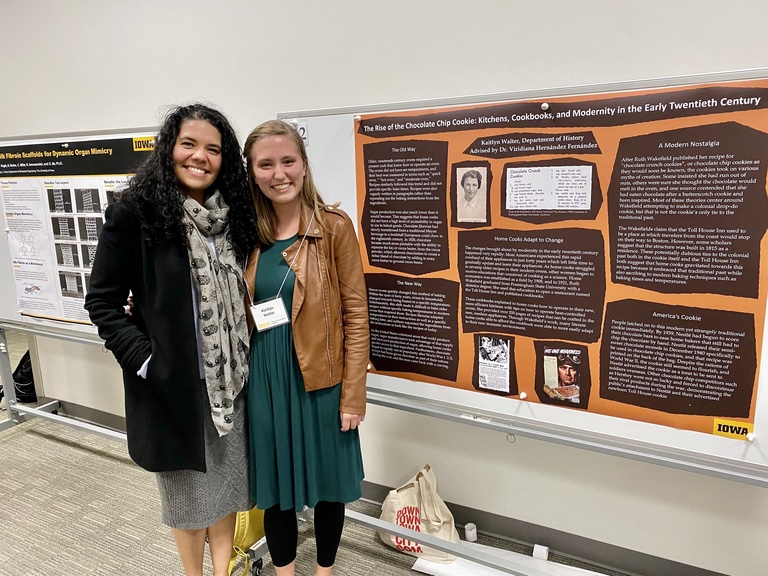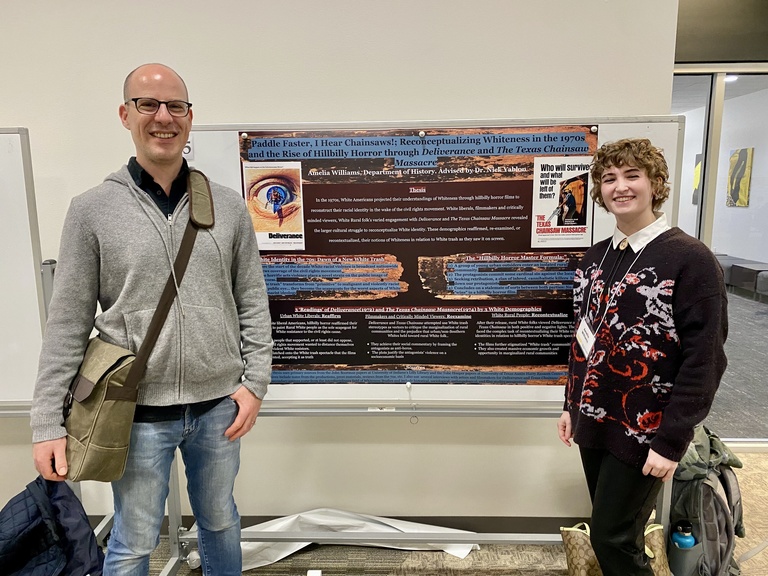Main navigation
Honors in the history major gives students the opportunity to conduct independent research on a topic of their choosing and to write an original piece of scholarship based on that research. The product is a thesis, a 25- to 35-page paper on the study of a historical problem. Think of the thesis as part of becoming an historian. You will put to use all the tools that you have learned in your history classes, devise your own research questions, and explore them through primary source research and analytical writing.
Writing the thesis is a rewarding experience. Students come to honors in the major for various reasons: some are interested in exploring further a particular historical period or topic that they have learned about in a previous course; others consider it a worthwhile experience before applying to graduate school; still others would like to get a taste of being a historian regardless of their post-graduate plans. Whatever path has led you to the honors program, by the end, you will have become an expert on your topic. And in your hands will be a concrete product of your learning as a history major.
Students in history honors receive a high level of faculty and peer support. They are also given opportunities to present their work to other faculty members through the thesis defense and to the larger university community at an annual research festival.
Requirements
By the fall of junior year, students must hold both a minimum 3.33 GPA in History courses and minimum 3.33 overall UI GPA.
Students must obtain permission from the History Department Honors Director to pursue Honors in the Major. Students should read the requirements and determine whether they meet the criteria. They should also familiarize themselves with the Timeline for Writing Thesis. If they meet the requirements or have any questions, they should schedule a meeting with the Honors Director to discuss their plan of study.
Students who pursue Honors in the Major must write a thesis. They must work with a designated faculty advisor and enroll in a two-course sequence. The first course (HIST:3995) should be taken in the spring of the junior year and the second (HIST:3996) in the fall of the senior year. These courses are only offered once per year. The six credit hours accrued from 3995/6 count toward the credit-hour requirements for the History major.
Students must defend the completed thesis before a 3-person faculty committee. Committee members will be decided upon near the completion of the thesis in November of the senior year.
The History Department selectively accommodates students whose academic course of study prevents them from enrolling in both HIST:3995 and 3996. In this scenario, you must have a History professor agree to guide you through the research, bibliographic, and/or writing process. Students will still need to enroll in one of the two-course sequence.
Timeline
Junior Year, Fall
- October: Attend the Information Session about Honors in the History Major
- Meet with Honors Director to obtain approval
- November: Early registration for HIST:3995: Honors Research Seminar
Junior Year, Spring
- Enroll in HIST:3996 (3 credits). In this seminar, learn how to devise research question, conduct and organize research, develop research proposal, write proposals for travel grants, begin writing.
- Choose a faculty advisor. In consultation with advisor, plan research and writing activity over the summer.
- April: Early registration for HIST:3996: Honors Thesis (3 credits)
- Late April: Complete Honors Thesis contract and submit to instructor
Summer after Junior Year
- Conduct research at various sites, if necessary
Senior Year, Fall
- Enroll in HIST:3996 (3 credits). In this workshop, peer review each other’s drafts in progress and complete the thesis.
- Continue to work with faculty advisor.
- Complete thesis in late October / early November.
- Distribute thesis to faculty defense committee.
- Defend thesis in late November or early December.
Senior Year, Fall/Spring
- Depending on your expected graduation date, communicate with History Advisor (Colleen Kelley) to complete audit in MAUI to graduate with Honors in the Major. If you are graduating in the Fall semester, contact the advisor in September; if in Spring semester, in February.
Honors in the major vs. University honors
Please note that University of Iowa Honors Program is a separate program to which students are admitted. Being enrolled in the University of Iowa Honors Program most likely qualifies you to pursue Honors in the Major, but it does not automatically mean that you will graduate with Honors in the Major.
If you are a University Honors student, completing Honors in the Major (the thesis) will satisfy your Experiential Learning Requirement.
Honors grading
Grades for HIST:3995 (Spring of junior year) are assigned by the instructor of that course. Grades for HIST:3996 (Fall of senior year) are assigned by the instructor and faculty advisor. It is the final grade for your thesis paper.
Faculty advisor
In the middle of the spring semester (while enrolled in HIST:3995), you will need to find a faculty advisor. The faculty advisor is usually a member of the Department of History, though students working on interdisciplinary projects may find that a co-advisor or primary advisor in another department is suitable. The advisor is an expert in your time period and/or geographic/thematic area of interest and will provide necessary direction to make your project successful.
You are responsible for finding an advisor. You may have already taken a class with a professor whose area of expertise aligns with your topic. If you do not have someone in mind, individual faculty websites give a good sense of what their research interests are. The instructor of HIST:3995 can help you in this selection process, too.
Recent honors theses
2024 - 25
- Adeline Bradley – The Unsung History of Urban Song: The Neglect of Urban Industrial Folk Song in the Early British Folk Revival
(Winner of the Stow Persons Award for Outstanding Senior Honors Thesis in History, Award for Outstanding Student Engagement) - Elisa Burba – And They Were Roommates: The Story of Margaret Keyes and Floy Eugenia Whitehead
(Award for Outstanding Academic Achievement, Award for Outstanding Student Engagement) - Joy Curry – “Whoredom Between the Breasts”: Nakedness, Shame, and Women’s Fashion in Seventeenth-Century English Sermons
(Winner of the Stow Persons Award for Outstanding Senior Honors Thesis in History, Award for Outstanding Academic Achievement) - Madeline DeCoste – “Disposal of the Body Would Be No Problem”: Situating MKULTRA Within Cold War Military Strategy
- Jaide Domatob – Divided by Neighborhoods, United in Resilience: the Enduring Strength of Black Waterloo (1970-2018)
- Colin Gillund – Growing Pains: Keeping the Grange Out of Partisan Politics in the Face of the 1873 Iowa General Election and Its Consequences on Agrarian Third Party Movements in Iowa
- Kaitlyn Masse – Cedar Rapids, the Great Migration, and Restrictive Covenants
- Zachary Paulsen – Villains in the Trade: Piracy in the British Middle Passage
- Gavin Scott – Walk The Line: Lyndon Johnson, the Elementary and Secondary Education Act of 1965, and the American Education System (Award for Outstanding Student Engagement)
- Isabella Rae Thomas – Divided Des Moines: Racial Property Restrictions in Iowa’s Capital City, 1910-1955
2023 - 24
- Anna Behrens – Brothers & Sisters Unite: Motivations, Meaning, and Conflicts of Take Back the Night in Iowa City, Cambridge, & San Francisco
- William Broadston Irvine – The United Irishmen: Nationalism, Catholicism, and Cultural Propaganda in 1790s Ireland
- Emma Caster – Lost in Translation; The Evolution of Spanish Translations and the Black Legend in England from 1578 to 1740
- Kate Dennis – Brammar’s West: Wyoming in the 20th century
(Award for Outstanding Academic Achievement) - Adam Engelbrecht – Floodplains and Sandbags: Iowa City and the Flood: 1918 - 2008
- Max Halbach – "To Make Virginia Blossom as the Rose”: Emigration, Enslavement, and Environmentalism in Eastern Virginia 1831 - 1860
- Jack Kapsner – We Don’t Need Any More Martyrs: May 1970 Anti-War Protests at the University of Iowa
- Gretchen Klock – Cancelling the Crosstown: Chicago’s Failed Expressway
- Cameron LaPage – Agency in Removal: How the Iowa Tribe Navigated War and Colonialism between 1812 and 1824
- Ismael Levya – Constructing Modernity: Debates Over Chavez Ravine’s Transformation Into Dodger Stadium, 1950 - 1962
- Daniel Ocon – La República de Los Indios: Tlaxcala, Survival, and the Struggle for Autonomy within New Spain, 1519 - 1558
(Winner of the Stow Persons Award for Outstanding Senior Honors Thesis in History) - Kaitlyn Walter – The Rise of the Chocolate Chip Cookie: Kitchens, Cookbooks, and Modernity in the Early Twentieth Century
- Yardley Whalen – Dykes, Dissent! Disrupt! Resist!: The 1993 Dyke March and the Shortcomings of Identity-Based Organizing
- Amelia Williams – Paddle Faster, I Hear Chainsaws!: Reconceptualizing Whiteness in the 1970s and the Rise of Hillbilly Horror through Deliverance and The Texas Chainsaw Massacre
(Winner of the Stow Persons Award for Outstanding Senior Honors Thesis in History)
2022 - 23
- Emily Arndt – “There Ain’t No Shame in Looking for a Better World”: The Evolution of Cultural Influence Behind the Folklore of Robin Hood
- Gabe Baccile – Influence of Anti-Catholic Organizations on the Jobs Available to Catholic Immigrants in Iowa
- Roxanna Barbulescu – “Nobody is Nostalgic for the Stalinist Era, But…”: Romanian American Memory of the Communist Period
(Award for Outstanding Academic Achievement) - Leighton Barnes – Hysterical Women: The Fight for an Expanded British Franchise at the Turn of the 20th Century
(Winner of the Stow Persons Award for Outstanding Senior Honors Thesis in History)
(Award for Outstanding Student Service) - Allison Clark – Commodifying the Spirit Lake Massacre: Abbie Gardner Sharp and Her Role in the Settler-Centric Memory of the Event
(Winner of the Stow Persons Award for Outstanding Senior Honors Thesis in History) - Phoebe Dillard – Wavering Divisions: Fluctuations of Gender Divides in British Civil Defense During World War II
- Nicole Gilbert – Fame and Femininity: First Lady Jacqueline Kennedy’s Public Diplomacy During the Cold War
(Award for Outstanding Student Service) - Dan Hettrick – Tlingit Resistance to Presbyterian Missionary Efforts and Forced Acculturation, 1866-1917
- Talia Hill – Alabama’s Black Belt: The Demographics that Shaped the Region
- Miles Kramer – Forever Conquered: The Changing Role of Vikings in Modern and Contemporary Anglo-American Culture
- Jesse Miller – “License to Do Evil in the Name of Good”: Political Radicalization and Organizational Success in the Wilmington Coup of 1898
2021 - 22
- Megan Christianson – Legislating the Landscape: The Battle for a Federal Wilderness Bill for Montana, 1979-1988
- Sophia Gilbert–The Direction of Lesbian Organizing During the Reagan-Bush Era
- Reagan Hart–“Injure Their Reputation, and Terminate Their Life”: Privacy for Venereal Disease Patients in Early Modern England
(Winner of the Stow Persons Award for Outstanding Senior Honors Thesis in History) - Jack Kamp–“It Ought to Be Possible”: The Kennedy Administration, Black Radicalism, and the Civil Rights Movement, 1963
- Jack Motz–“Rudy Thinks He’s Batman”: Koch, Giuliani, and Dinkins in the 1989 Race for Mayor
- Lauren Johnson–Holding Out For a Hero(ine): A Postfeminist Analysis of Superhero Stories from the 1980s
- Jack Lauer–Breaking Bread: The Equal Rights Amendment and the Politicization of Foodways, 1972-1982
(Winner of the Stow Persons Award for Outstanding Senior Honors Thesis in History) - Sydney Uhlman–“Love in Action”: Christian Anarchism in the Catholic Worker Movement
2020-21
- Nicole Allen–The Life and Patronage of Elizabeth Sprague Coolidge: Exploring Developments in Cultural Philanthropy with the Institutionalization of American Classical Music
- Emily Bronswick—"I Felt if Things Didn't Change, the World Would Come to an End": Black Iowa Women's Activism During the Civil Rights Era, 1945-1965
(Winner of the Stow Persons Award for Outstanding Senior Honors Thesis in History) - Alyssa Grady–"My Ladys Soul": The Successes of Elizabeth Siddal and Jane Morris, & the Rise of the Pre-Raphaelite Sisterhood
- Hannah Haack–Pilots in the First World War: How the Phenomenon of the Flying Ace Impacted the War Effort
- Carly Heying–“To Follow the Bright Star”: American Involvement in the Spanish Civil War and the Shaping of the U.S. Popular Front, 1937-1938
(Winner of the Stow Persons Award for Outstanding Senior Honors Thesis in History)
(Award for Outstanding Academic Achievement for the highest cumulative History GPA) - Megan I McEvoy–Rural Resistance: The Communist Party in 1930s Iowa Farming Communities
- Lydia Nesslar–The Woman Question: The Intersection of Evolutionary Discourse and the Development of Early Feminism
- Dieter Ostermann–The Engineering, Science, and Management War Training Program: Higher Education and the Second World War
- Salma Rios–Man, Myth, Legend: The Many Faces of Thomas More
- Travis Siegel–“If We Had Lost The War, We All Would Have Been Prosecuted As War Criminals:” The Bombing Campaign Against Japan in World War Two
- Allison Steger–Paving the Way for a Public Presence: Gay and Lesbian Activism, Methods, and Successes in East Germany
(Award for Outstanding Academic Achievement for the highest cumulative History GPA)
2019-20
- Harry Daley-Young–The Fall of Penn Central and the Rise of Conrail: Corporate Failure and the Politics of Deregulation and Nationalization in the 1970s
- Sydney DeBoer—In Our Schools, In Our Stores, and In Our Homes; The Office of Price Administration, 1941-1947
(Award for Outstanding Student Service) - Samuel Eck–The Emma Goldman Clinic: From Collectivism to Corporatism
- Emma T Johnson–“One Day There Will Be No Such Thing as Religious Intolerance”: Anti-Catholicism During the Election of 1960
- Benjamin Kimball–Severus of Antioch and the Anti-Chalcedonian Movement
- Emily Lefeber–“Nothing Comes to Her Who Sits and Waits”: The League of Women Voters of Iowa and Citizenship After Woman Suffrage, 1920-1940
(Winner of the Stow Persons Award for Outstanding Senior Honors Thesis in History) - Benjamin Louviere–Beer and Spirit: A confluence of medieval traditions in brewing and monasticism
- Cameron Moeller–Variably Innate: Inconsistent British Perceptions of Martial Races in the Late-Victorian Indian Army
(Winner of the Stow Persons Award for Outstanding Senior Honors Thesis in History)
(Award for Outstanding Academic Achievement) - Katlyn Rozovics—Passive Imperialists: The Imperial Attitudes in Ryse: Son of Rome
- Clayton Saffran-Johnson–Money Talks: A History of Campaign Finance Reform in the 2000s
- Michael Steffen–Offensive to the Majority: The Formation, Activism, and Survival of the Iowa City Gay Liberation Front, 1970-1999
(Award for Outstanding Academic Achievement)
2018-19
- Audrey Brock—She’s Lost Control: Portrayals of Mentally Ill Women in Mid-20th Century Popular Culture
- Ethan Everhart—Comstock, Comedy and Conservatism
- Gwyneth Forsythe—Girl Guides in the First World War: Claiming a Place in the Public Sphere
- Olivia Kane—Prophecy for the Nation: Thomas of Erceldoune’s Prophetic Legacy in the Scottish Wars of Independence and Beyond
- Mila Kaut—“Go on, thou brave woman leader”: Churchwomen, Churchbuilding, and Print Culture in the Construction of Black Citizen Identities in Iowa, 1868-1900
(Winner of the Stow Persons Award for Outstanding Senior Honors Thesis in History) - Sarah Lauer—Honor and Shame in the Sagas of the Icelanders: Women’s Struggle for Influence
- Joseph Steinbronn—Reviewing the Robertson Commission and Mwambao on the Kenyan Coast
- Zhonghua Wang—Concentration, Pollution and Regulation: Iowa Hog Production from 1978 to 2017
2017-18
- Evan Bittner—The Socialization of Socialism: Radical Leftist Periodicals in Iowa and the Midwest, 1895-1920
- Katherine Boyd—Partial Suffrage in Iowa: 1894
- Allison Buser—The Andreae System: Defending Brewing Interests and Consolidating German-American Political Power In the 1914 Iowa State Elections
- Abby Dockum—"Upon the Fields of Friendly Strife”: The Role of Sport at the Iowa Pre-Flight School, 1942-1945
(Winner of the Stow Persons Award for Outstanding Senior Honors Thesis in History) - Rebekah Gansemer—Opposing Tyranny: White Resistance against the Rhodesian Front (1965–1977)
(Winner of the Stow Persons Award for Outstanding Senior Honors Thesis in History) - Cindy Garcia—A Turf Issue: Mexican American Perspectives on Interactions with African Americans in Davenport, 1949-1972
- Morgan Hebert—The Monster study: A Case Study in ethical research practices
- Brian Miner—1965 Communist Purge in Indonesia, U.S. Foreign Relations in Indonesia
- Paige Mitchell—Reconsidering the Rhetoric of Cultural Display: A Look at the University of Iowa Museum of Natural History’s Meskwaki Diorama
- Megan Ryan—Herbert Hoover & the American Relief Administration’s Efforts in Soviet Russia, 1921-1923; Anti-Soviet Sentiment Stymies Success
- Julia Rohn—Creating the Encomium: The Progression of Emma of Normandy’s Political Career
- Joshua Stringer—The Greatest American Comeback: Harry S. Truman and the 1948 Election
2016-17
- Cormac Broeg—Killing Buter's Bloodhounds: Iowa Soldiers and an Act of Political Violence in Reconstruction South Carolina
(Winner of the Stow Persons Award for Outstanding Senior Honors Thesis in History) - Forest R. Johnson III—The Uncrowned King: Axel Oxenstierna and Sweden's Rise to Power During the Thirty Years War
- Katelyn Zingg—Civil War Prison Escapes
2015-16
- Taylor Finch—"Powerless, With a Guitar": Music and Student Protest at the University of Iowa: 1965-1971
- Ryan Kunkle—Hanc [Animam] Tu Exerce Optimis in Rebus: Cicero's Use of a Platonic Rhetorical Framework to Provide a Spiritual Justification of His Political Philosophy
(Winner of the Stow Persons Award for Outstanding Senior Honors Thesis in History) - Xiao Albert Wang—Into Modernity: Political Struggle and Transition during the Late Qing Dynasty
- Abigail Weaver—Establishing an Institution: The Public Library Movement in Iowa 1900-1920
2014-15
- Catherine Babikian—Our multi-racial way of life? Immigration, disease, and identity in Britain, 1958–1983
- Sylvia Bochner—“Here is Why I Love the Fight”: Gender, Labor and Family in the Letters of Pearl McGill
- Quinn M. Hejlik—Slovak Questions and Communist Answers: The Communist Czechoslovak Government's Response to Slovak National Identity Following the Prague Spring of 1968
- Maureen Owens—"Justice, Temper, Magnanimity, and Judgment": Classical Influences on the Public Persona of Elizabeth I
- Scott Pate—“Cram Your Spam”: Ottumwa and the P-9 Hormel Strike of 1985-86
- Emily J. Pettit—Aborigines’ Dreaming or Britain’s Terra Nullius: Perceptions of Land Use in Colonial Australia
- Matthew Rechtoris—Eugenical Legislation and Sterilization in Iowa: 1911-1977, From Francis Galton, Buck v. Bell (1927), to the Iowa Board of Eugenics
- Ashley Wiser—“Dear John Letters": A Study of American Break-Ups Via Mail During World War II
(Winner of the Stow Persons Award for Outstanding Senior Honors Thesis in History)
Completing a history thesis was one of the best things I've done at UIowa! In addition to exploring a topic that was interesting and meaningful to me, I was able to travel while strengthening my research, writing, and analytical skills. Both classes in the thesis process helped me to find my topic and guided my progress, making it an exciting and manageable experience. I would encourage all history students to consider pursuing honors in the major!
History Honors Director
This experience was beneficial for preparing for graduate school. I would also say that it was challenging academically and personally but that the professors want you to succeed. I enjoyed FURF and the support that the history department gave. It was a learning process, and one must go in with that mindset.
Definitely write an honors thesis. You get to explore whatever topic you're interested in, travel, and improve your writing and argumentation. The history department and university offer generous funding for research, and you get to share your passion for learning with a close group of friends. I had a great time and felt more confident in my writing and research skills after.
University of Iowa Honors Program
In addition to honors in the major, students may pursue honors study and activities through membership in the University of Iowa Honors Program. University honors students must maintain a 3.33 grade-point average, complete 12 semester hours of coursework designated as honors courses, and complete 12 semester hours of an experiential learning project. Visit Honors at Iowa to learn about the university's honors program.
NOTE: Membership in the UI Honors Program is not required to earn honors in the major.

